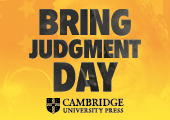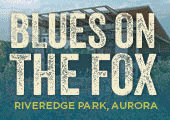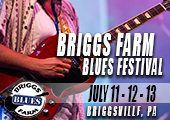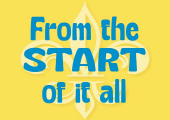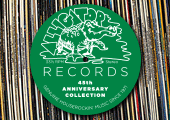LEE FIELDS
Sentimental Fool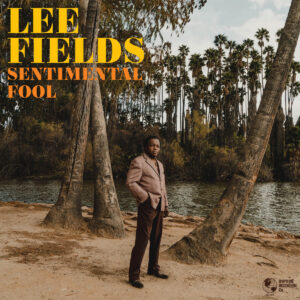
Daptone – DAP-075
The continuing autumnal renaissance of soul singer Lee Fields is one of those heartwarming stories of overdue success and acclaim coming late in life that is impossible to imagine in pop or rock. As with Charles Brown and Professor Longhair, two artists who had scored minor hits in their youth yet found their greatest professional success only decades later, Fields (profiled in LB #252) is only now making the best music of a career stretching back more than half a century.
As with his other recent outings, Sentimental Fool is a slice of undiluted vintage soul; it’s as if rap, hip-hop, and neo soul simply never happened. The songwriting, the arrangements, and the harmony vocals all sound as if they were laid down in Memphis, Muscle Shoals, or Philly circa 1967.
And it’s no shtick—this isn’t retro soul, or some kind of throwback vibe. It’s the real thing, the music Fields grew up on and cut his teeth on, just as Sinatra’s two late-in-life Duets albums were nothing more than the master drawing from his own wellspring.
Fields’ first release for Daptone Records—the former home of the late Sharon Jones—comes right out of the gate with as strong a song as he’s yet laid down.
Forever opens with a short horn chorus before Fields’ rough-hewn, yet quivering, tenor vocal dives straight into the kind of all-encompassing passionate love song of the type that Steve Harvey waxes so poetically about in The Original Kings of Comedy. This is mature, adult music about enduring married love. The horn interludes between vocal choruses are tight and bright—don’t be surprised if you momentarily think you’re listening to a lost Stax side.
Victor Axelrod’s southern-flavored piano frames Fields’ hurting vocal on I Should Have Let You Be, while the background vocals are understated, yet add depth and richness. The title track features a call-and-response between Fields and his backup singers that hearkens to the way Gladys Knight interacted with the Pips.
Fields is at his most plaintive on Just Give Me Your Time, with his tale of a wounded heart punctuated by smart horn choruses and drums, the harmony slowly picked out on guitar. The swirling organ and strings underpinning Fields’ soaring vocal on The Door are arranged in a way not in vogue in soul music in four decades—yet have lost none of their ability to build the song’s sense of drama. The Latin-tinged rhythm and organ fills on Without a Heart likewise lend a vintage feel, while Your Face Before My Eyes sounds a bit like a show tune from the same period.
As with all great rhythm and blues, the foundation of Fields’ latest recording is the rhythm section: drummer Brian Wolfe and bassist Benny Trokan. The horn section of Neal Sugarman (tenor sax), Dave Guy (trumpet), and Ian Hendrickson-Smith (reeds), and organist Jimmy Hill, combine with the other players credited above to create a unique sound—one woven from threads drawn from different classical soul sources.
The result is a tremendous album, with most of the dozen songs likely to lodge in your head.
—Jim Trageser
KIRK FLETCHER
Heartache by the Pound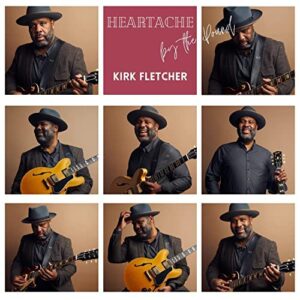
Ogierea Records – No #
Kirk Fletcher’s consistently great guitar playing makes it easy for his audience to expect excellence from him, and he doesn’t disappoint with his latest outing, Heartache by the Pound, released on his own label, Ogierea Records. While Fletcher was living in Switzerland, the ten tunes were mostly recorded at the legendary FAME Studio in Muscle Shoals, Alabama, where his musical heroes Aretha Franklin, Wilson Pickett, Allman Brothers, et al. reigned supreme. Other tracks were crafted in Los Angeles and Nashville. Sidemen include former Double Trouble organist Reese Wynans, Robert Cray drummer Terence Clark, and Randy Bermudes who played bass for the FAME sessions. Like so many others, Fletcher developed his latest album during the pandemic era.
He teams up with longtime collaborator and former Cray bassist Richard Cousins on Shine a Light on Love with a deep medium-tempo soul groove, complete with horn blasts and gospel-tinged choir behind him. His B.B.-flavored licks support his rich, caramel-coated voice. The tempo slows on Afraid to Die, Too Scared to Live when he dips a bit into a style that perfectly blends the stylings of Robert Cray with Albert King to create his own lane.
The title track, Heartache by the Pound, taps into a groove reminiscent of the soulful touch of Tyrone Davis. Fletcher offers insightful and personal lyrics that reflect life’s daily challenges: “heartaches by the pound . . . so easy to be lost, so hard to be found.” I’ve Made Nights by Myself is a juicy blues shuffle that settles into the perfect lope to make you tap your feet and bob your head, with a guitar solo that’s simple and tasty.
Darkness comes creeping when Fletcher and Cousins teams up again to pen the tune The Night’s Calling for You as he laments, “The night is falling, my heart’s calling.” The writing duo follow this up with Wrapped up, Tangled up in the Blues, a funky piece with a strong backbeat that finds Fletcher’s guitar tone displaying more grit than the previous pieces on the album—his out-chorus solo is perky and popping.
The next two pieces, Wrong Kind of Love and I Can’t Find No Love are penned by Dennis Walker. Funky drums open the first track where Kirk really shows off his gunslinger, blues rock licks at the end. The next track slows things down and serves as a bookend to the perfect response to the mantra established in the previous piece.
Tarheel Slim’s Wildcat Tamer is an outright country rocker replete with twangy guitars, rollicking barroom piano, and tight snare to slap it home. Fletcher delivers the Nashville-tinged solo with authenticity (performed on a baritone guitar), serving up an unexpected and refreshing blast. Finally, Hope for Us offers an anthem for the future—a song that gradually builds to a blazing crescendo and the most powerful guitar solo on the disc, with all the room Fletcher needs to stretch out and make his final stand.
Kirk’s singing seems to get stronger with each album, and his guitar playing gets tastier and tighter—he doesn’t dispense any throwaway licks. His melodic statements always have purpose and direction, indicative of the entire album which surely will delight his fans
—Wayne Goins
BOB CORRITORE & FRIENDS
You Shocked Me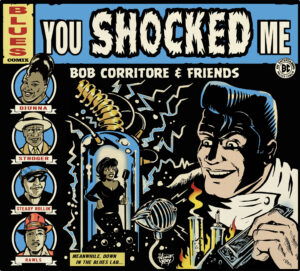
VizzTone – SWMAF 21
You Shocked Me is the perfect title for this high voltage collection of electrifying performances that are equally charged by Bob Corritore’s blistering blues harmonica and the roster of 36 friends he’s assembled, including 11 powerful lead vocalists. Recorded at a dozen sessions between 2018 and 2022, the remarkable 16-track program brings together a host of distinctive stylists and maintains a cohesive sound, a feat that recalls another stellar revue of blues giants, the classic album The Johnny Otis Show Live at Monterey! (1970). Corritore, like Otis, is a white musician who immersed himself in African American music and used his position to showcase contemporary Black artists. The singers who light things up here include John Primer, Johnny Rawls, Alabama Mike, Diunna Greenleaf, Sugaray Rayford, Willie Buck, Oscar Wilson, Francine Reed, Bill “Howl-N-Madd” Perry, Bob Stroger, and Jimi “Prime Time” Smith. In addition, Corritore recruited quite the lineup of guitarists to add sparks to these tracks, such as Kid Ramos, Johnny Main, L.A. Jones, Bob Margolin, Johnny Rapp, Patrick Skog, and the aforementioned Primer, Smith, and Perry. It’s a stunning display of talent from start to finish.
Primer, who has collaborated extensively with Corritore, kicks things off with his searing lead guitar on Hiding Place, sparring with the leader’s harmonica and proving why he is the man on the contemporary Chicago blues scene. The title track with Greenleaf on lead vocals features an irresistible hook and boasts a taut blues guitar dialogue between Margolin and Jones. Johnny Rawls’ gospel/blues The World’s in a Bad Situation is another captivating number that just won’t let go. That’s also the case with Primetime Smith’s Soul Food. It’s so straightforward that it sounds like he’s pulling the lyrics from a handwritten menu, and it’s amazingly effective. One of the most compelling tracks lyrically is Back to the Crossroads, Perry’s signifyin’ variation on Robert Johnson’s classic composition. While most of the tracks are hard driving, a few slow numbers provide variety, including Wilson’s cover of Jimmy Reed’s Blue Blue Water and Alabama Mike’s impassioned Somebody Stole My Love from Me.
Corritore’s harmonica work is outstanding throughout with varying tones and attacks that thoroughly complement the voices and styles of the singers. He doesn’t push himself into the spotlight but certainly provides the continuity that makes these 16 tracks work together as a seamless whole. There is no doubt that this is the real deal on the contemporary blues scene, and for 2022 critics’ and readers’ polls and annual awards, You Shocked Me is a landmark recording that must be recognized. Press play and feel the jolt!
—Robert H. Cataliotti
JOHN NÉMETH
May Be the Last Time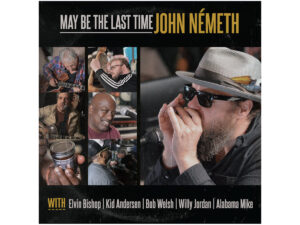
Nola Blue Records – NBR 020
May Be the Last Time, the latest release from blues and soul vocalist John Németh, is an album with a backstory that’s every bit as striking as the music. When Németh joined Kid Andersen, Elvin Bishop, Bob Welsh, Willy Jordan, and Alabama Mike for a two-day recording session at Andersen’s Greaseland Studios, he was awaiting surgery for ameloblastoma—a benign, aggressive tumor in his lower jaw. The treatment Németh faced, including the removal of part of his jaw and a bone graft, meant it was uncertain if he would ever return to performing. Despite facing a life-changing health crisis, Németh and his friends managed to create an album that overflows with joy and passion.
On the title track, Németh’s vocals sound more like an exuberant celebration than a lament. Intertwining guitars from Bishop and Welsh create a gritty, energetic backdrop for Németh’s soulful voice. The heavenly backing vocals from Jordan, Welsh, Andersen, and Alabama Mike are a stunning reminder that audiences are listening to a special recording. The energy level remains high on Rock Bottom, with Németh’s voice and harmonica chops in fine form. Deft keyboard work from Welsh rounds out the arrangement, and the background vocals add to the track’s loose, spontaneous feel. A raucous take on Henry Ballard’s Sexy Ways finds the musicians having a blast in the studio. Németh’s voice and harp have never sounded better, and Bishop and Welsh’s guitar work is seasoned with a healthy dose of grease and hot sauce.
Even when the tempo slows, Németh and friends lose none of their power. On a lowdown reading of Come on In This House, Németh’s throaty growls and piercing falsetto will give listeners chills. A spirited cover of Shake Your Hips is an inspired slice of raw blues. Guitar work from Andersen, Bishop, and Welsh creates a dense, swampy atmosphere while Németh’s vocals and harp cut through the mix. As of this writing, Németh has undergone surgery and is using social media to keep his fans updated. In the meantime, the musicianship and camaraderie displayed on May Be the Last Time is strong enough to remind listeners of why they first fell in love with the blues.
—Jon Kleinman
DR. JOHN
Things Happen That Way
Rounder – 1166101766
Back in 1959, an 18-year-old guitarist named Mac Rebennack released his first single called Storm Warning. It didn’t sell very well, but its title was prescient. It was a warning that this young man would go on to storm through American music—blues, R&B, fonk (as he liked to call it), jazz, rock, pop—and make his mark as a major singer, instrumentalist, songwriter, arranger, sideman, and producer. Over six decades later, Rebennack, who achieved his initial fame as Dr. John the Night Tripper, says his goodbyes with his final recording project, the beautifully understated Things Happen That Way.
With his health failing, Rebennack, who passed away in 2019, worked with multi-instrumentalist, songwriter, and co-producer Shane Theriot to craft a ten-song program inspired by his lifelong love for traditional country and western, particularly the R&B/country crossover efforts that Ray Charles recorded in the early 1960s. That the album’s release has been accompanied by the reported alterations of a few of the tracks from the original Rebennack/Theriot collaborations by his family estate that took control of the material is ultimately irrelevant because it’s completely overshadowed by the good doctor’s massive talent and totally unique musical persona.
The album opens with Rebennack’s familiar craggy N’Awlins drawl counting off the opening of Willie Nelson’s Funny How Time Slips Away, giving way to a spare, simple piano and voice intoning the first verse, “Well, hello dere / my, it’s been a long, long time,” and the rest of the band slowly joins in riding on drummer Carlo Nuccio’s in-the-pocket, strutting parade beat for a laid-back, lilting tour de force. And, it has been a long time that this man has charmed listeners, and it’s bittersweet to realize this is the last go ’round. Rebennack may have had a country album in mind, but his cover of Hank Williams’ Ramblin’ Man shows that he remained hoodooed to the very end. It’s funky, dark, and haunting with Theriot’s lap steel winding through the swampy mix. Country music was certainly on his mind for the traditional Gimme That Old Time Religion, a duet with old friend Willie Nelson, a beguiling, effortless—in the best sense of the word—performance enlivened by drum and tambourine master Herlin Riley’s oh-so-laid-back-but-locked-in second line beat. Rebennack reaches back to his debut album, Gris-Gris (1968), for a remake of I Walk on Gilded Splinters. His vocals from the original Theriot-produced sessions are grafted on to a funky, blues rock accompaniment recorded by Lukas Nelson & Promise of the Real (hopefully the original remake version with Rickie Lee Jones will surface some day). Rebennack’s piano and vocal, supported by Jon Cleary on additional keyboards and Theriot multi-tracking guitars and beating out a groove on a cardboard box, are all that are needed to craft an enchanting version of another Williams classic I’m So Lonesome I Could Cry. Riley’s percolating second line drumming shapes an unlikely recasting of the Traveling Wilburys’ End of the Line that features interweaving vocal lines from Rebennack, Aaron Neville, and the Nashville-based singer Katie Pruitt. Rebennack and Theriot collaborated on guitar-driven, gospel-influenced Holy Water; the rollicking R&B of Sleeping Dogs Best Left Alone; and the loping funk of Give Myself a Good Talkin’ To that features textured keyboard parts from the leader on piano, Cleary on B3 organ, and David Torkanowsky on Wurlitzer piano. A stripped-down cover of the Jack Clement–composed, Johnny Cash hit Guess Things Happen That Way brings Rebennack’s fare-thee-well to a close. It’s imbued with a world-weary wisdom and is a fitting capstone to a towering musical legacy.
—Robert H. Cataliotti
LITTLE FREDDIE KING
Blues Medicine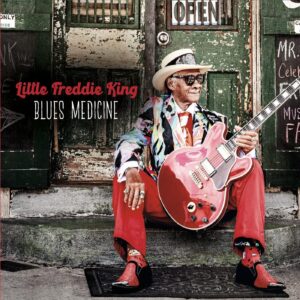
Made Wright Records – MWR-77
Little Freddie King’s remarkable late career resurgence is making it ever more obvious that the New Orleans blues survivor will probably outlive us all.
King—born Fread E. Martin 82 years ago in McComb, Mississippi—is back out playing live gigs following the pandemic shut down and is pumping out the kind of boozy, lo-fi electric blues that’s made him a Big Easy icon.
After an excursion into psychedelic blues that featured wild production cues, cosmic vocal overdubs, and samples on the excellent Absolutely the Best (2019) and Jaw Jackin’ Blues (2020), King strips it down to the bones on Blues Medicine. Continuing his collaboration with drummer/producer and songwriting partner “Wacko” Wade Wright, King serves up ten original tracks that tell vivid stories of booze-filled joints, two-timing women, bar fights, and gun-toting degenerates delivered in his scraggly, gravel road voice.
King’s albums play out like first-person accounts from living life on the razor’s edge. He’s got enough life experiences to fill a bookshelf of autobiographies—the liner notes say he’s survived three shootings, a near fatal bike accident, and an accidental electrocution—so there’s no need for songwriting hyperbole or exaggeration.
With equal parts Hubert Sumlin and Little Milton with a dash of Freddie King (Little Freddie played bass briefly in the Texas bluesman’s band in the ’60s), King’s songs take you into the seedy underbelly of New Orleans. From the true life story of Canal St. Corner Bar (“Just another night in paradise”) to the wicked story of wanton gun play on Don’t Worry About Me (“I’m going to Chicago to buy myself a gun”), there’s no doubt he’s been there, done that, and channels it all into his unfiltered blues.
Tattered relationships are a recurring theme on songs like Crazy Woman, We Are Through, and Two Timer. King gets personal on the brutally honest Fatherless, when he sings, “When my father left, I became a bad boy,” as Vasti Jackson’s slide guitar adds a mournfully haunting touch.
Amid all the sin, heartache, and debauchery, Dust on the Bible sounds like it comes straight from the pulpit. Caress Me Baby, with its beautiful opening descending guitar riff and lonesome harp, is the closest thing to a ballad here. Little Freddie serves up some of his best fret work on a pair of great instrumentals—Coke No Ice and Two Wheel Cadillac.
Blues Medicine is the perfect prescription for searchers of honest, no-frills blues played by a tough-as-nails musician who’s the definition of resilience.
—Rod Evans
BLUE MOON MARQUEE
Scream, Holler & Howl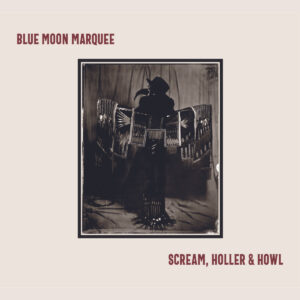
Idla – No #
Put on your dancing shoes people, the Blue Moon Marquee is back with another riveting album that will make you jump and shout, or, as the title accurately implies, Scream, Holler & Howl.
The Blue Moon Marquee is a Canadian duo that delivers first-class vintage, sophisticated, jazz-tinged swing and jump blues. This is the fifth album by A.W. Cardinal (vocals/guitar) and Jasmine Colette a.k.a. Badlands Jass (vocals / upright bass / drums). Cardinal is a stylish, eloquent guitarist in the jazzy tradition of T-Bone Walker and Pee Wee Crayton, who sings in a raspy deep tenor reminiscent of somewhere between Tom Waits and Chuck E. Weiss. Notably, A.W. Cardinal was nominated for Indigenous Songwriter of the Year at the Canadian Folk Music Awards for the album Bare Knuckles and Brawn. Colette is a lovely, honey-voiced, sultry singer and a swift, versatile bassist. Together they make a potent duo with refined musical taste and boundless virtuosity in the foundational blues genres, with a strong backbeat groove and wailing, swinging horns.
Scream, Holler & Howl is a joyous musical pleasure co-produced by their stylistic cohorts and musical soulmates Duke Robillard and Erik Nielsen. In our time of cold, modern digital recording practices and computerized music productions, this refreshing album has an old-fashioned, natural retro feel—hot music made by real humans with truehearted, impassionate feeling, recorded live to tape. They brought along a swift, kickass full band featuring some of Canada’s finest veteran players: Darcy Phillips (Jann Arden) on piano and Hammond organ and the fierce Jerry Cook (Colin James) on tenor and baritone saxophone. Other guest musicians include Matt Pease on drums, Paul Pigat on guitar, and Bonnie Northgraves on trumpet.
This hard-driving album of 13 prime cuts packs a spellbinding combination of smooth-groove, uptown, showboat-lounge instrumentation as you might have heard it in the golden era of the blues, with tinges of Roma jazz (in a less-enlightened age referred to as Gypsy jazz). You’ll hear musical moments that could fit to Cab Calloway, Amos Milburn, or Roy Milton, and also jazz-influenced modern players like Duke Robillard and Ronnie Earl. They included two cuts by Lonnie Johnson, Another Night to Cry and Long Black Train. All other songs are originals, and all are of a musical form that played a significant role in the evolution of jazz, rock ’n’ roll, and rhythm and blues.
The masterful and totally fun album is both refined and consistent, with every song done just right. There is not a weak cut on the album. There will be many different album releases in 2022; different, yes, but none better.
—Frank Matheis
GA-20
Crackdown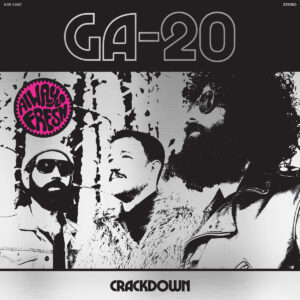
Karma Chief – KCR-12007
The guitar-and-drums duo format is one with a long and rich history in the blues idiom. That stripped-down setup has also found success in rock acts, from Flat Duo Jets to the White Stripes to the Black Keys and beyond. Taking the concept one step forward, Matthew Stubbs and Pat Faherty launched GA-20 in 2018. With drummer Chris Anzalone, GA-20 released its debut album, Lonely Soul, in 2019. The album featured blues classics alongside original songs in a compatible style.
For their second long-player, the Chicago blues group paid tribute to a hero with 2021’s Try It . . . You Might Like It! GA-20 Does Hound Dog Taylor. The album—made in cooperation with (but not released by) Bruce Iglauer’s Alligator Records—was well-received. Even without bass guitar, the trio produced a sound honoring Taylor’s memory, with a character reminiscent of Peter Green’s Fleetwood Mac. Released the same year, a live EP (Does Hound Dog Taylor Live!) was a bit redundant, but underscored the commitment of GA-20’s instrumental and vocal delivery.
For Crackdown, the group expands its sonic palette while remaining true to its roots. Fairweather Friend is steeped in the blues, but owes a debt to ’60s garage rock and the punk aesthetic as well. As before, the group’s guitar work features thunderous overtones that imply the presence of bass guitar, rounding out the sonic frequencies in a pleasing manner. Songs like Fairweather Friend maintain blues structure, but incorporate a subtly pop-leaning character that should serve to draw a wider audience.
The loping Dry Run is informed by country blues, but applies those standards to a decidedly electric arrangement, with production values heavy on slap-back echo, giving the song a classic Sun Studio feel. Released as a single ahead of the album, Easy on the Eyes draws its melody from well-worn blues phrasing, yet it pulls the melody into the 21st century, creating something equal parts modern and reverent. Anzalone’s splashy, clattering percussion is the perfect foil for the stinging lead and hypnotic ersatz-bass guitar.
With crowd noises in the background, Crackdown has the feel of a soulful dance floor raver, with hints of the Meters and Booker T. & the MG’s added to the mix. The instrumental dialogue between the two guitarists is crackling with excitement. The album’s sole cover is an ace reading of Ben E. King’s Just Because, sped up and all but reinvented for current-day listeners.
By My Lonesone rocks hard, conjuring thoughts of early rock ’n’ roll; it’s a cousin to Nick Curran’s 21st century retro masterpiece Reform School Girl. The blues shouter I Let Someone In is cut from similar cloth, but its slower pace only heightens the danger and excitement. Double Gettin’ features snaky, sultry percussion that encourages hip shakin’.
Gone for Good applies the GA-20 formula to Red House–styled bluesology, Hendrix style. A brief reprise, Fairweather Friend (Final Goodbye) recasts the opening song in a sparer, haunting arrangement that once again reconnects GA-20 with its roots.
The uniformly astounding Crackdown blows by in less than 29 minutes, doubling down on the retro character of GA-20’s chosen style. But quality wins out over quantity every time, and the latest from GA-20 is nonstop quality. Carefully yet confidently expanding their musical perspective, the trio has all the elements for breakout mainstream success.
—Bill Kopp
DEMETRIA TAYLOR
Doin’ What I’m Supposed to Do
Delmark Records – DE 875
Singer Demetria Taylor grew up in a musical household. Her father was Eddie Taylor, rhythm guitarist for Jimmy Reed. Demetria launched her own career, winning the B.L.U.E.S. on Halsted Blues Diva contest in 2010. She released her debut album, Bad Girl, on Delmark in 2011. That record showcased Taylor’s expressive, gritty, and soulful vocal style, and featured assured, spare backing by a crack instrumental ensemble. A highlight of the collection is its title track, an up-tempo remake of her late father’s 1955 single, Bad Boy.
It would be more than a decade before Taylor returned with a follow-up, but Doin’ What I’m Supposed to Do vividly demonstrates that Taylor has developed as an artist in the intervening years. The straightforward Chicago blues flavor that informed Bad Girl remains at the heart of Taylor’s approach, but her intensity and the expressiveness of her voice has only deepened.
As showcased on the album’s opener, 83 Highway, Taylor’s vocal range has expanded. She can still churn out the gutbucket roar, but there’s a newfound nuance in her delivery that makes the material even more satisfying. And the instrumental work is superb as well. 83 Highway features some extended lead guitar work by Billy Flynn; his sinewy playing functions as a foil to Taylor’s singing; the result often takes the form of a vocal-guitar duet.
The ensemble demonstrates its versatility by shifting gears completely for the burning, propulsive Baby Be Good. Here Taylor completely abandons the gruff delivery style that characterized her earlier work in favor of a highly accessible dance/R&B approach. The song’s well-developed arrangement showcases Taylor’s vocal, but it still leaves plenty of space for the band to stretch out and dig in.
Vocalist Deitra Farr—recipient of the 2017 Koko Taylor Queen of the Blues Award—guests on vocals for Blues Early This Morning. Her husky pipes mesh wonderfully with Taylor’s voice on the tune, and the brief spoken back-and-forth between the two is a delight.
Though its title seems to reference Taylor’s spotlight number of a decade ago, Bad Girl Day is a song of a very different character. It’s a soulful, R&B-flavored number, one that finds the singer expanding on the smooth side of her vocal approach. There’s a strong dance-oriented feel to Welfare Blues, with subtle yet insistent use of wah-wah guitar at its core. Brian James’ organ solo on the track is thrilling, and it leaves the listener wanting more. James turns to piano for another stellar solo on the kinetic Nursing My Kitty Cat.
The smoky I’m Gonna Tell It opens with some deliciously inviting lead guitar licks, and the band takes a minimalist approach, clearing the sonic landscape for Taylor to lay down another assured vocal. And while the approach is used sparingly on the album, Taylor’s double-tracked voice is a highlight of the record on its closing number, Young Gun Taylor.
Crystalline production by Delmark’s Julia Miller and Elbio Barilari helps keep the focus on the music, with nothing in the way of filigree or gimmickry. The sound of Doin’ What I’m Supposed to Do is an expert balancing of living, breathing audio document and gleaming, sophisticated studio production.
And speaking of that Koko Taylor award, Demetria Taylor is the well-deserved recipient of that honor for 2022.
—Bill Kopp
HOWELLDEVINE
Strange Time Blues
DynaPhonic Records – No #
Traditional blues music cuts deeply into our culture; it’s the song of the night, of the mean streets where men and women went to express and release their pain.
The trio HowellDevine, formed in the San Francisco Bay Area in 2011, brings us up to date, detouring into our present, frighteningly apocalyptic, new world with their CD, Strange Time Blues. It’s an era where the pain cuts deeper and is more widespread than ever: days of disaster, devastation, poverty, calamities of all kinds. This, HowellDevine’s first release from their new label, DynaPhonic Records, and their fifth release overall, takes us to these dark places whether we want to go there or not.
Josh Howell’s vocals have a somber depth, as he masterfully plays his National resonator guitar and harmonica with crystal clarity. The band covers six classics, while adding four originals. Pete Devine on drums and Joe Kyle Jr. on upright bass provide a background that is steady, hypnotic, and sometimes funereal.
These songs, sounding old and new at the same time, strip the music down to its bare essentials, notes reverberating over a naked landscape.
The album kicks off with a version of Fred McDowell’s I Walked All the Way from East St. Louis about a man who’s hoboing, without “one poor lousy dime” (“A dark cloud is rising / I wonder what’s gonna become of me”). On Nila, a woman, hunchbacked and hobbling, has seen far better days. Now, she’s dragging her trash down the lane while drinking from a tall can to kill her pain. She’s got lung cancer, with six months to live, as she stops to light a Winston.
Environmental disaster darkens the skies and waters. Fire is the villain on Smoke (“hills ablaze in the daytime / all night flames lash through the sky”) and flooding on the Memphis Minnie / Joe McCoy number When the Levee Breaks, where Howell sings, “Crying won’t help you / praying won’t do no good.”
The futuristic instrumental Strange Time Meltdown has Howell’s eerie guitar recreating the sound of rockets colliding over a burning planet. On another instrumental, Hey! Oh, Really?, Howell’s harmonica takes a strong lead backed by Devine on washboard and porcelain whiskey jug.
Add their version of Muddy Waters’ Long Distance Call and songs by R.L. Burnside and Blind Boy Fuller and this may be the best album of 2022.
—Robert Feuer


